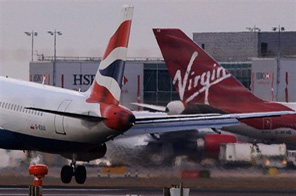No improvement in airline prospects until end 2009
GENEVA: Airlines have reverted to pessimism about business prospects and do not expect any improvement in international air travel until the end of 2009, IATA said on Thursday.
The global recession has been cited as the main reason for deteriorating demand, but the impact of the swine flu pandemic is also being highlighted by airlines responding to the International Air Transport Association's survey.
"The glimmer of optimism about financial performance for the coming 12 months seen in April's survey has faded as respondents, on balance, indicate further declines in profitability ahead," said IATA.
"Even the optimistic respondents don't see significant recovery before Q4 this year and others not until early 2011," it added.
The airline industry has been battered by the global recession. As businesses attempt to reduce costs, cut backs have been made in particular to business travel.
IATA noted that premium traffic -- business class or first class travel where carriers typically make their money -- fell more in May than in prior months this year.
"Passenger travel numbers in May cast doubt on the view that a bottom to the travel decline has been reached," it said.
In May, premium traffic passengers fell 23.6 percent, compared to a fall of 22 percent in April, and a drop of 19.2 percent in the first quarter.
IATA noted that economy travel appears to be growing for Europe-Middle East and Middle East-Asian routes, but this could also reflect a shift of business travellers from premium to economy class.
The impact of swine flu also began to be felt in May.
IATA had earlier said that the H1N1 virus depressed air travel by about one percent globally in May.
The slump was particularly marked in travel within central America which indicated a 62.4-percent fall in May. Traffic between central and south America also plunged 46.7 percent during the month.
European and American airlines were more downbeat than carriers in Asia, which expect "stabilisation of profitability."
Meanwhile, IATA also warned of what it described as "de-globalisation" amid the crisis, as economic stimulus packages unveiled by governments focus spending on boosting domestic economies.
The association feared that these measures are being implemented at the expense of world trade and capital links, and could further hurt international travel.
"The deterioration in international air travel in, to and from Asia during May, despite recovering economies in the region, is a worrying sign of what is being called 'deglobalisation'," said IATA.
Overall international air passenger traffic fell 9.3 percent in May following a year-on-year decline of 3.1 percent in April, a month traditionally buoyed by holiday travel over the Easter period.
IATA added last month that airlines are expected to lose nine billion dollars this year, the worst slump the industry has ever faced.
Combined with the revised estimate that it lost 10.4 billion dollars in 2008, the industry now looks set to lose almost 20 billion dollars over two years.






